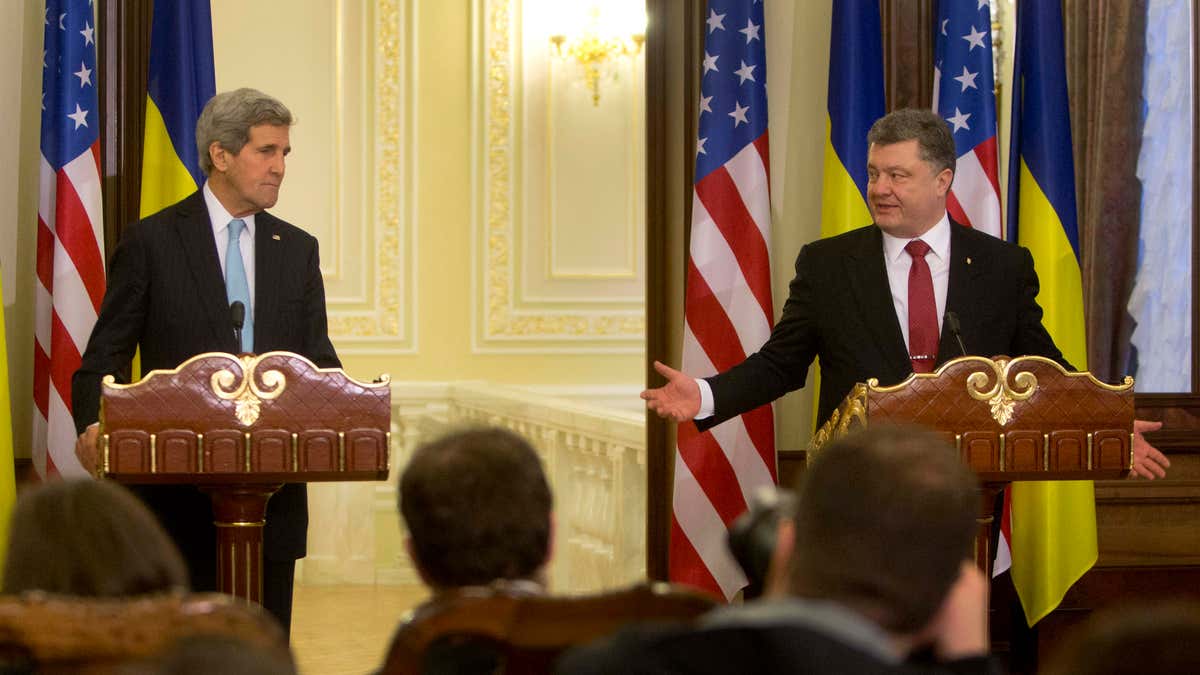
Feb. 5, 2015: Ukrainian President Petro Poroshenko, right, gestures toward U.S. Secretary of State John Kerry during their statement to the media at the Presidential Administration Building in Kiev, Ukraine. (AP)
The Obama administration is taking a cautious approach toward the new Ukraine peace deal, which was reached Thursday without any input from American leaders, as the U.S. weighs the option of arming Ukraine and sanctioning Russia even further.
Despite reservations about the new agreement, U.S. officials say any action on lethal aid or new sanctions are on hold.
The U.S. is concerned the new deal, which was struck Thursday among the leaders of France, Germany, Russia and Ukraine, might give Russia and pro-Russian rebel too much and are also skeptical the rebels or Russia will abide by the pact.
"This agreement must now be followed by immediate, concrete steps to fulfill the commitments by all parties," White House press secretary Josh Earnest said. "The true test of today's accord will be in its full and unambiguous implementation, including the durable end of hostilities and the restoration of Ukrainian control over its border with Russia."
"Actions will be what matter now," Secretary of State John Kerry said. "We will judge the commitment of Russia and the separatists by their actions, not their words."
U.S. officials say they are ready to push additional sanctions on Russia if the country or the rebels should break the cease-fire agreement. The administration’s possible plan to go as far as arming Ukraine with defensive weapons led to the meeting in Minsk that brokered the peace deal.
However, officials have reaffirmed that plans for sanctions and weapons transfers have shifted to the back burner as the U.S. assesses the results of the Minsk deal.
"We maintain the ability and the resources to put additional sanctions in place, should the situation on the ground warrant it," State Department spokeswoman Jen Psaki told reporters.
Kerry said in his statement that the U.S. remains willing to consider easing sanctions on Russia if and when the terms of the agreement are implemented. Those include a full cease-fire, the withdrawal of all foreign troops and equipment from Ukraine, the restoration of complete Ukrainian control of its border with Russia, and the release of all prisoners held by both sides.
The peace deal requires Ukrainian parliament to give wide powers to the eastern regions for restoring such control. It will not take effect until the end of the year. The deal also might give rebels greater amount of territorial control than they held when the two sides reached a cease-fire in September.
Sen. John McCain, R-Ariz., the chairman of the Senate Armed Services Committee and a frequent critic of administration foreign policy, lashed out at these apparent shortcomings, which have led some to charge that the U.S. may have lost leverage by not being directly involved in the negotiations.
"The agreement reached in Minsk freezes the conflict at a time of separatist advantage, solidifies the gains of Russian aggression and leaves Ukraine's border with Russia firmly under Moscow's control pending a comprehensive political settlement whose content is unknown and feasibility is unclear,"
McCain said in a statement. He added that the deal should not be used as an "excuse to delay sending defensive lethal assistance to Ukraine."
"Providing defensive lethal assistance to Ukraine is not inconsistent with the search for a political solution, it is an essential component to achieving it," he said. "Nothing about this deal has changed that."
The Associated Press contributed to this report




